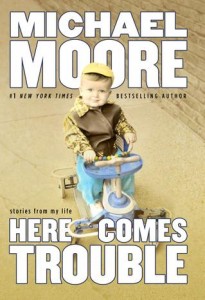I was doing a random google search of troublemakers and I came across this article from Rolling Stone (12/2005). It was part of a special feature on Mavericks, Renegades and Troublemakers of 2005. Michael Moore wrote the introduction for it. Here are some highlights from Moore’s reflections on making trouble [emphasis is mine]:
Thanks to a number of individuals who, in 2005, dared to step out of line and say something real, the public had begun a seismic shift away from the chokehold of uniform and uninformed thought.…As a rule, we are instructed from childhood that serious consequences shall arise if we dare to rock the boat. We learn instinctually that it is always better to go along so that we get along. To slip off the assembly line of group think means to risk ridicule, rejection, banishment. Being alone sucks, but being alone while you are attacked, smeared and scorned is about the same as picking up a hot poker and jamming it in your eye. Who in their right mind would want to do that? Especially when conformity to the community offers as its reward acceptance, support, love and the chance to be comfortably numb.
So, troublemaking (and rebelling, rabble-rousing, being a brat–which are all categories in this special issue) is: daring to step out of line; saying something real; and shifting away from uniform and uninformed thought–from being the same and being ignorant.
We don’t make trouble because: there are serious consequences for rocking the boat (troubling the waters); refusing to participate in group think is risky and leads to rejection and ridicule; challenging others is often an ostracizing and solitary endeavor which can lead to violent attacks; and conformity is comfortable and comforting.
Note: Moore’s description of being attacked because you rock the boat as the equivalent of jamming a hot poker in your eye reminds me of Theodor Adorno and this passage from Minima Moralia: “The splinter in your eye is the best magnifying glass.” I will have to find my copy of the book (at least I think I have a copy) and reread it. That might provide for an intriguing way in which to read Moore’s comments.
Here is some more of Moore’s introduction:
This year’s mavericks and rabble-rousers stuck their necks out — and they didn’t get them chopped off. They helped the nation make a turn toward the truth, and average Americans began to speak their minds freely in the diners and the churches and the bars, little words of discontent and dissent and growing outrage. You can argue that it was five years and 2,100 dead soldiers too late. Or you can say that Americans may be slow learners, but when we finally figure something out… well, watch out. A new majority forms, and there can be no stopping it. Stands taken by this year’s troublemakers had become, by year’s end, the mainstream position of the American people. Every poll shows the same thing: The majority now oppose the war and no longer trust the president when he speaks. The time is ripe to get this country back in the hands of the majority. Will we seize the moment? Or will we need a whole new crop of rebels next year to keep us honest? Thank God we will still have artists and writers and everyday citizens willing to sign up for the call. Those who dare to be different are the closest thing we have to a national treasure.
This passage raises some interesting questions for me: Can we be a nation of troublemakers? Or, if troublemakers become the majority do they lose their ability to make trouble? What is the process that occurs when troublemakers unsettle us to the point that we listen–really listen–to what they have to say? The image I get of the troublemaker from Moore’s description here is that of someone (or a bunch of someones) who provoke us into action. These troublemakers are not part of the action, instead, they cause the action. But, is that the only role of the troublemaker? What kind of action is troublemaking itself? And, how can troublemakers participate in the action themselves?
Finally, what do we make of Moore’s final statement: “Those who dare to be different are the closest thing we have to a national treasure”? If you are part of the majority can you dare to be different? Earlier in the passage, Moore argues that the majority of American’s disagree with the direction of the country and the President (this is 2005, remember). If you are part of that majority and you share the same opinion, can you dare to be different (whatever that means) and still be part of the majority? If not, is Moore suggesting that those who are different–who stand out, who don’t conform and who are willing to challenge the mainstream–are not us (the majority) but simply treasures (objects) that we should keep around to remind us of where we are going wrong or how we should change? If so, where and how do these figures fit into the community–are they just exalted figures that are different from us OR can we learn to be our own troublemakers?
 Last week, I came across Michael Moore’s new book of stories about his own life, Here Comes Trouble. Here’s how he briefly describes it on his blog (italics are mine): “It contains two dozen short stories, all based on events in my early life, before I became a filmmaker. They tell how, from a young age, the “personal” in my life slowly boiled up and exploded, quite unexpectedly, into the political.” I’m interested in reading more about how Moore envisions himself as trouble. (I’ve already written a little bit about his valuing of trouble/troublemaking here.) I’m also really interested in how he understands the connections between the personal and the political (and if he cites feminism in his understanding).
Last week, I came across Michael Moore’s new book of stories about his own life, Here Comes Trouble. Here’s how he briefly describes it on his blog (italics are mine): “It contains two dozen short stories, all based on events in my early life, before I became a filmmaker. They tell how, from a young age, the “personal” in my life slowly boiled up and exploded, quite unexpectedly, into the political.” I’m interested in reading more about how Moore envisions himself as trouble. (I’ve already written a little bit about his valuing of trouble/troublemaking here.) I’m also really interested in how he understands the connections between the personal and the political (and if he cites feminism in his understanding). Seeing this book title reminded me of another trouble memoir I recently came across: Christine O’Donnell’s Troublemaker: Let’s Do What it Takes to Make America Great Again. I think it might be incredibly useful to analyze both of these books as I continue to work on complicating and clarifying what I mean by making and being in trouble. Both authors want to claim the role of making/being in trouble, yet each has very different sets of political goals. How do we distinguish between their uses (and valuing) of trouble? This reminds me of some recent discussions about the similarities and differences between tea party members (O’Donnell was a tea party candidate) and Occupy Wall Street organizers and participants (Moore is a strong supporter of OWS and is possibly planning to do a documentary about them). Check out The Week’s recap of these discussions from earlier in October, Occupy Wall Street: The Left’s Tea Party?
Seeing this book title reminded me of another trouble memoir I recently came across: Christine O’Donnell’s Troublemaker: Let’s Do What it Takes to Make America Great Again. I think it might be incredibly useful to analyze both of these books as I continue to work on complicating and clarifying what I mean by making and being in trouble. Both authors want to claim the role of making/being in trouble, yet each has very different sets of political goals. How do we distinguish between their uses (and valuing) of trouble? This reminds me of some recent discussions about the similarities and differences between tea party members (O’Donnell was a tea party candidate) and Occupy Wall Street organizers and participants (Moore is a strong supporter of OWS and is possibly planning to do a documentary about them). Check out The Week’s recap of these discussions from earlier in October, Occupy Wall Street: The Left’s Tea Party?